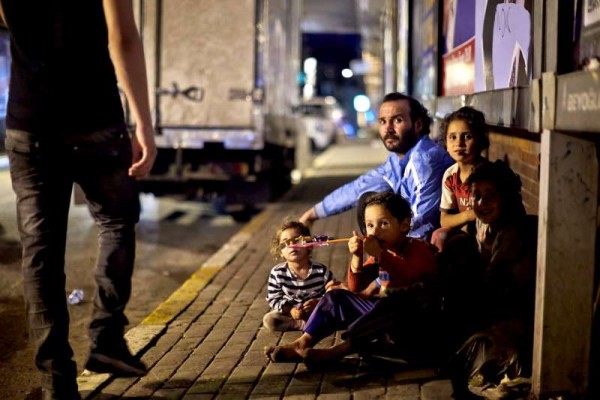France has knocked back Russian pressure for billions in reconstruction funds to the Assad regime, including Moscow’s argument that many of Syria’s 6.6 million refugees can soon return.
Foreign ministry Spokeswoman Agnes von der Muhll, echoing the UN, said conditions for refugees to re-enter Syria have not been met. She cited the regime’s treatment of civilians in areas which pro-Assad offensives have reoccupied, and noted a possible assault on the last major opposition territory in northwest Syria.
With 75% of Syria’s GDP lost during the 89-month conflict, and unable or unwilling to provide the money necessary for widespread rebuilding, Moscow has been pushing in recent weeks for other countries to support the regime. Vladimir Putin raised the issue last week with German Chancellor Angela Merkel, and Foreign Minister Sergey Lavrov denounced the US and UN for supposedly blocking assistance.
Russian officials have declared that the issue of refugees in Europe and other areas can be eased, with a massive return to Syria.
But France’s Von der Muhll noted detentions and forced conscriptions that have followed pro-Assad takeovers, including East Ghouta near Damascus and much of southern Syria this spring and summer. She also cited a regime decree depriving refugees and internally displaced people of their properties unless they are claimed within 30 days, a practical impossibility for many outside Syria.
This year has seen the largest movement of displaced people since the beginning of the conflict and … the entire international community has warned of the risks of a major humanitarian and migratory crisis in the event of an offensive against the province of Idlib [in northwest Syria].
France, the US, and other countries have said they will not support a major reconstruction program until there is a negotiated political transition under UN supervision.
The Assad regime, supported by Russia and Iran, has rejected any transition.
Bolton: No Advance in US-Russia Meeting Over Iran’s Presence
Following talks in Moscow, US National Security Advisor John Bolton said Thursday that there has been no advance on the issue of Iranian and Iranian-led troops in Syria.
The Trump Administration is calling on Russia to ensure that all Iranian forces leave the country. But Bolton was cautious in his remarks after a five-hour meeting with President Vladimir Putin’s advisor Nikolai Patrushev:
That would be an objective that I think President Putin would share….[But] it’s far from easy to achieve. We talked about a variety of ways it might be accomplished through a series of steps.
Bolton said that he rejected — as Secretary of State Mike Pompeo had in earlier discussions — a Russian proposal to keep Iranian forces out of a zone near the Israeli-occupied Golan Heights, in exchange for US suspension of sanctions against Iran’s energy and finance sectors in November.
Russia and Israel reportedly held discussions this summer on an exclusion zone extending 85 km (51 miles) from Israeli-controlled territory.
Deputy Foreign Minister Sergey Ryabkov gave a muddled statement rejecting the US demand while holding open negotiations:
We treat with great respect Iran’s steps to provide its own security and actions, including on Syria at the invitation of this country’s lawful government. However, this does not mean that there are no prospects or space for further work in this sphere….
We’ve got many inconsistencies with the Americans in this area. Approaches are directly opposite in some cases, but here as well, which is important, there are grounds for continuing dialogue regarding Syria.
Turkey Again Rejects Russia Push for Pro-Assad Offensive on Idlib
Turkey has again knocked back Russia’s attempts to set up the pretext for a pro-Assad offensive to retake the last major opposition area — Idlib, northern Hama, and western Aleppo Province in northwest Syria.
Sitting alongside Russian counterpart Sergey Lavrov in Moscow on Friday, Foreign Minister Mevlüt Çavuşoğlu warned:
Preserving the de-escalation zone in Idlib, Syria is important in both humanitarian respects and the fight against terrorism.
A military solution there would be a disaster. It would be a disaster not only for the Idlib region, but also for the future of Syria.
Çavuşoğlu noted that up to 3 million people, many of them displaced from other parts of Syria, live in Idlib.
Turkey already has more than 3 million registered Syria refugees, and fears that many more civilians will be displaced by an assault by the Assad regime and its allies. The Turkish military, which intervened in August 2016, is alongside rebels in the area.
See Syria Daily, August 15: Russia Presses for Pro-Assad Offensive on Idlib, Turkey Says No (For Now)
Çavuşoğlu and Lavrov have met twice this month. As in the earlier meeting, Lavrov tried to establish the cause for violation of the “de-escalation zone” — proclaimed by Russia, Turkey, and Iran last year — by arguing that “terrorists” must be wiped out.
Turkey’s Defense Minister Hulusi Akar and intelligence chief Hakan Fidan accompanied Çavuşoğlu in the visit to Moscow, meeting Russian Defense Minister Sergey Shoygu.
US Suspends $30 Million of Aid After Food Distributed to Jihadists in Idlib Province
The US has suspended $30 million of assistance to civilians in Syrian opposition areas after food was given to fighters of the jihadist bloc Hay’at Tahrir al-Sham.
Investigators said an unnamed NGO added the fighters to lists of civilians in Idlib Province, and then covered up the records. The NGO’s staff were “under duress” from HTS, according to the investigation.
After the inquiry, 27 personnel were dismissed.
The total amount of the grant from the US Agency for International Development is $44.6 million.
The US Government has designated HTS as a “terrorist organisation” because it includes the faction Jabhat Fatah al-Sham which — as Jabhat al-Nusra — was linked to Al Qa’eda until July 2016.

